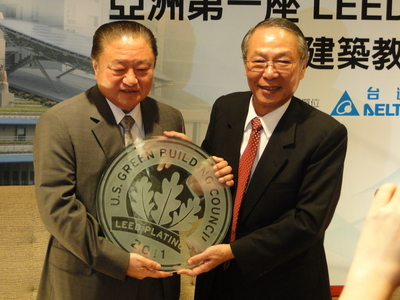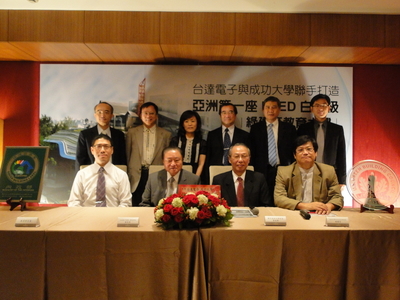Taiwan’s First Zero-Carbon Building Gets Global Top Honor


Tainan, Taiwan, August 11th, 2011
The Y. S. Sun Green Building Research Center at National Cheng Kung University, Taiwan’s first zero-carbon building, was awarded the top honor by a globally recognized green building ranking system of the U.S. Green Building Council (USGBC).
The center, best known as the Magic School of Green Technology, was awarded a certificate of the Leadership in Energy and Environmental Design (LEED) by the USGBC -- a recognition that will put it on the list of The World’s Greenest Buildings next year.
The Y. S. Sun Green Building Research Center is the world’s first green education center, sponsored by NCKU, Delta Electronics’ Chairman Bruce Cheng and more than 30 enterprises.
“I’m proud that our Magic School of Green Technology has passed the strict evaluation of the certification system,” said NCKU President Hwung-Hweng Hwung in a press conference on August 11.
Delta Electronics’ Cheng noted that the award indicates a worldwide recognition of the company’s image and he will put in great efforts to design low-carbon products to help protect the Earth.
The three-storey, 4,800 square-meter green building, 100% built with green materials with 65% energy saving and 50% water saving, serves as the university’s international conference center and is used to showcase technological innovations of green buildings.
It is estimated that the building uses 35% of the energy needed in a typical office building. Other key features include toilets which can reduce water runoff -- part of the designs resulting in 50% water saving -- and roof garden soil which uses light-weight ceramics.
The Magic School of Green Technology has gained numerous world recognitions. Its construction process was recorded by the Discovery Channel in 2009 and it has received an outstanding award in the World Green Roof Conference in Hainan, China.
The building has also won the highest green building certificate from Taiwan’s Ecology, Energy Saving, Waste Reduction and Health (EEWH) rating system a few months back.
It will be included in The World’s Greenest Buildings next year and become one of the 10 buildings representing Asia in the book, which will highlight about 60 projects worldwide that its co-authors said represent “the best of the best.”
“We have signed contracts with companies such as 3M and Formosa Plastics Group,” said Hsien-Te Lin, an architecture professor at NCKU and leader of the construction team. “Taiwan Businessmen’s Dongguan School in mainland China has also asked us to design a green activity center and green campus for them.”
The Y. S. Sun Green Building Research Center at National Cheng Kung University, Taiwan’s first zero-carbon building, was awarded the top honor by a globally recognized green building ranking system of the U.S. Green Building Council (USGBC).
The center, best known as the Magic School of Green Technology, was awarded a certificate of the Leadership in Energy and Environmental Design (LEED) by the USGBC -- a recognition that will put it on the list of The World’s Greenest Buildings next year.
The Y. S. Sun Green Building Research Center is the world’s first green education center, sponsored by NCKU, Delta Electronics’ Chairman Bruce Cheng and more than 30 enterprises.
“I’m proud that our Magic School of Green Technology has passed the strict evaluation of the certification system,” said NCKU President Hwung-Hweng Hwung in a press conference on August 11.
Delta Electronics’ Cheng noted that the award indicates a worldwide recognition of the company’s image and he will put in great efforts to design low-carbon products to help protect the Earth.
The three-storey, 4,800 square-meter green building, 100% built with green materials with 65% energy saving and 50% water saving, serves as the university’s international conference center and is used to showcase technological innovations of green buildings.
It is estimated that the building uses 35% of the energy needed in a typical office building. Other key features include toilets which can reduce water runoff -- part of the designs resulting in 50% water saving -- and roof garden soil which uses light-weight ceramics.
The Magic School of Green Technology has gained numerous world recognitions. Its construction process was recorded by the Discovery Channel in 2009 and it has received an outstanding award in the World Green Roof Conference in Hainan, China.
The building has also won the highest green building certificate from Taiwan’s Ecology, Energy Saving, Waste Reduction and Health (EEWH) rating system a few months back.
It will be included in The World’s Greenest Buildings next year and become one of the 10 buildings representing Asia in the book, which will highlight about 60 projects worldwide that its co-authors said represent “the best of the best.”
“We have signed contracts with companies such as 3M and Formosa Plastics Group,” said Hsien-Te Lin, an architecture professor at NCKU and leader of the construction team. “Taiwan Businessmen’s Dongguan School in mainland China has also asked us to design a green activity center and green campus for them.”
Provider:
新聞中心
Date:
100.08.11